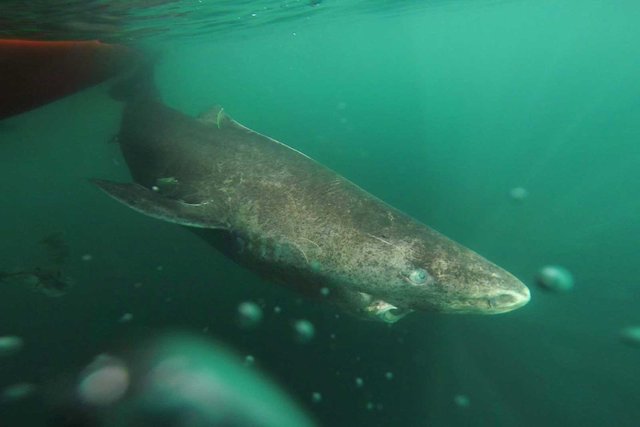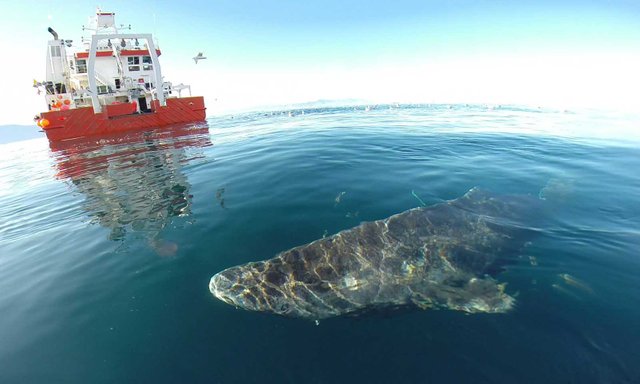
Sharks that were alive hundreds of years ago are still swimming strong. A Greenland shark has been found to be at least 272 years old, making the species the longest-lived vertebrate in the world—smashing the previous record held by a 211-year-old bowhead whale. But it may have been as old as 500 years!
The research team, led by Julius Nielsen—a marine biologist at the University of Copenhagen, used radiocarbon dating to determine the ages of 28 of the animals. The team estimated that one 5-metre animal was at least 272 years old, but could be more than 500 years old (392 +/- 120 years). Another was at least 260 years old, and could be more than 400 years old.
Speaking with New Scientist, Nielson said:
We definitely expected the sharks to be old, but we didn’t expect that it would be the longest-living vertebrate animal.
Living deep in the North Atlantic and the cold surface waters of the Arctic, Greenland sharks have a stable environment and grow just a few centimetres per year. Despite their slow growth, though, they reach more than 5 metres in length and are often the apex predator in their ecosystem.
Determining the age
It was once thought to be impossible to age Greenland sharks. Other fish are aged by measuring calcareous bodies that grow in their ears, but Greenland shark skeletons are made of cartilage and, therefore, lack the calcified growth rings of hard-boned vertebrates.
In a BBC interview, Nielsen explained that "the Greenland shark is a very, very soft shark—it has no hard body parts where growth layers are deposited. So it was believed that the age could not be investigated."
Instead, Nielsen and his colleagues focused on radiation in the sharks’ eyes. Nuclear bomb tests in the 1950s and ’60s blasted radioactive particles into the atmosphere. Those particles entered food webs all over the world and show up in the form of radioactive forms of carbon in organisms that lived through that period.
Greenland sharks’ eye lens tissue is pretty unique; it doesn’t change during its lifetime and preserves the historic radiation:
The Greenland shark's eye lens is composed of a specialised material, and it contains proteins that are metabolically inert.Which means after the proteins have been synthesised in the body, they are not renewed any more. So we can isolate the tissue that formed when the shark was a pup, and do radiocarbon dating.
For the study, the team examined 28 sharks, which had already died after being caught in fishing nets as by-catch.
There's a bit of uncertainty associated with the age estimates, but Nielsen says the most likely age for the oldest shark they found was about 390 years. "It was, with 95 percent certainty, between 272 and 512 years old," he says.
Steven Austad, who studies the biology of aging at the University of Alabama, Birmingham says:
It's a fascinating paper and certainly moves back the vertebrate longevity record by a substantial amount. Even if you look at the low end of their estimate—272 years—that's still substantially longer than any other documented vertebrate.Conservation lessons
The team believes that Greenland sharks only reach sexual maturity when they are 4m-long. Considering their long life-span, it suggests this does not occur until they are about 150 years old.
The researchers say this has consequences for future conservation of the animals. Because of their extreme longevity, Greenland sharks may still be recovering from being over-fished before WW2! On this issue Nielsen said:
When you evaluate the size distribution all over the North Atlantic, it is quite rare that you see sexually mature females, and quite rare that you find newborn pups or juveniles.It seems most are sub-adults. That makes sense: if you have had this very high fishing pressure, all the old animals—they are not there anymore. And there are not that many to give birth to new ones.
There is, though, still a very large amount of 'teenagers', but it will take another 100 years for them to become sexually active.
Studies like this one show us, time and time again, just how incredible the natural world is, but they also highlight nature's fragility to human impacts on the environment. That's why we built Search for the Planet: a non-profit search engine that directs 90% of its profits to environmental charities. Check it out if you have a spare few minutes.
Featured image: A Greenland shark returning to the deep and cold waters of the Uummannaq Fjord in northwestern Greenland. The sharks were part of a tag-and- release program in Norway and Greenland. All Photos: courtesy Nielsen/Science.

Hi! I am a content-detection robot. This post is to help manual curators; I have NOT flagged you.
Here is similar content:
http://www.adaptnetwork.com/environment-nature/500-year-old-sharks-roam-earths-oceans/
Downvoting a post can decrease pending rewards and make it less visible. Common reasons:
Submit
Yep - I wrote the original article.
Downvoting a post can decrease pending rewards and make it less visible. Common reasons:
Submit
Hi @cheetah and @anyx, could you please whitelist me for reposts from my website (adaptnetwork.com)? Please let me know if you require additional verification. Thanks for your help.
Downvoting a post can decrease pending rewards and make it less visible. Common reasons:
Submit
Great stuff, btw those are bots, they wont answer your request. Just ignore them. I think there should be some kind of verification mechanism for posts like yours since there will be more people moving their blogs to steemit. @dan
Downvoting a post can decrease pending rewards and make it less visible. Common reasons:
Submit
Thanks for sharing your work with us @benadapt!
A 270+ year old shark sounds almost unbelievable, and yet here it is. I guess the oceans still hold a ton of secrets that we have yet to discover.
Cheers!
Downvoting a post can decrease pending rewards and make it less visible. Common reasons:
Submit
Thanks for the support @albertfall - glad you enjoyed the post.
Downvoting a post can decrease pending rewards and make it less visible. Common reasons:
Submit
My pleasure @benadapt! Keep posting awesome content.
Downvoting a post can decrease pending rewards and make it less visible. Common reasons:
Submit
Awesome images buddy. Thanks for sharing with us @benadapt
Downvoting a post can decrease pending rewards and make it less visible. Common reasons:
Submit
Thanks @vishal1 - glad you enjoyed the post.
Downvoting a post can decrease pending rewards and make it less visible. Common reasons:
Submit
I find it amazing that some animals can even live for that long. These badboys could've lived well before the French Revolution and potentially back to when Columbus discovered America. However, I find it equally as amazing we can determine a sharks' age by looking at it's eyes.
Downvoting a post can decrease pending rewards and make it less visible. Common reasons:
Submit
Same here @lentus - it's just inedible. Puts things into perspective.
Downvoting a post can decrease pending rewards and make it less visible. Common reasons:
Submit